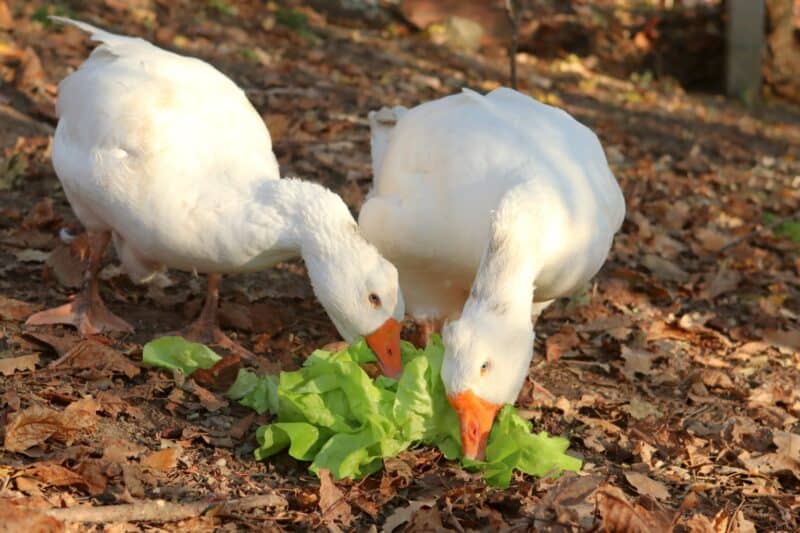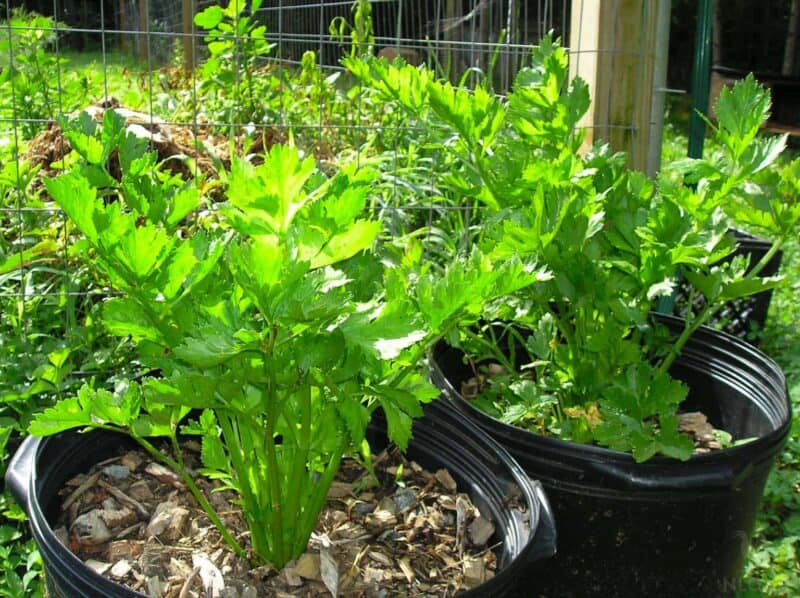Out of all the different foods that geese eat, with no question their favorite kind of foods are leafy green ones. Grass makes up the majority of their diet, along with various grains and other foliage.

Basically if it’s a plant, and it’s green, geese want it, and this also includes a lot of different vegetables as many poor farmers who have endured a goose invasion will attest.
How about something like celery? Celery is a staple in many kitchens, but it is sometimes mocked as being a vegetable that takes more calories to eat than it provides. Whatever the case, can geese eat celery?
Yes, geese can eat celery and derive pretty good nutrition from it. Celery stalks and tops are easily digestible by geese, and it has a good variety of vitamins and minerals that geese need in their diet, including folate, vitamin K, potassium, and magnesium.
You might like celery or you might not, but I can guarantee you now that your geese will love it.
Although geese usually prefer to just eat the leafy, tasty tops off of celery they will eat the stalks if they are tender enough and cut up to an appropriate size.
Celery can be a great supplement to the usual diet of geese, and in the rest of this article I’ll tell you everything you need to know about giving it to them.
Does Celery Have Health Benefits for Geese?
Yes, absolutely. Celery has plenty of benefits for geese, no predominantly in the form of its vitamin and mineral content because it has very little to offer in terms of calories, from protein, fat or carbs.
But what an assortment of vitamins and minerals it has! Don’t believe the old urban legend that states celery is basically chewable water; the nutrients present in celery can improve many factors of a goose’s overall health, including:
- organ and cellular function,
- the balancing of metabolism and electrolyte levels particularly during periods of sustained activity or high temperature,
- the growth and repair of connective tissue,
- the promotion of strong bones,
- and much more…
Of particular interest to goose keepers is that celery also proves to be a wonderful supplement for improving feathering and the production of eggs in laying dames.
Concerning the feathering, this is vital anytime a goose is healing from accidental injury or an injury from a fight or predator attack.
The more smoothly feathering proceeds, the less overall resources the bird will need and the less stress they will endure.
Also, the benefits of strong and healthy eggs are obvious, as more of them will be viable if you are expanding your flock naturally, or you’ll enjoy better and higher-quality eggs if you are collecting.
Also don’t discount that this can help keep the dame safe since she is less likely to suffer egg-laying mishaps.
All told, celery can greatly enhance the overall health and well-being of your geese!
Nutrition Info for Celery
Celery has a solid and varied nutritional profile, though not a stellar one. Looking at the vitamin content first, we see that celery has a little bit of pretty much everything, with the only standout vitamin present being vitamin K.
Other vitamins include vitamin A, thiamine, riboflavin, niacin, pantothenic acid, vitamin B6 folate and vitamin B12, vitamins C, D and E along with just a little bit of choline. Pretty impressive!
The mineral content is likewise pretty varied but not exceptional, and celery stalks and greens alike will provide your geese with calcium, copper, iron, phosphorus, magnesium, potassium, sodium and zinc.
Celery is also noteworthy for its extremely high water content, averaging about 95% water by weight.
Combined with the potassium and other vitamins present in celery this is a perfect option for geese to help them stay hydrated and beat heat stress on the hottest days.
Can Geese Eat Raw Celery?
Yes, and this is without question the very best way to serve it to them. Raw celery is easy for geese to eat and digest, and it also has the best possible amount of nutrients that geese need.
You might need to chop raw celery for your geese, but that is all.

Can Geese Eat Celery Leaves?
Yes, they sure can, and the leaves are their favorite part of the whole plant. Geese love celery leaves because they are light, crisp and “grassy”, their typical favorite foods.
Full of flavor, and they contain even more vitamins and minerals than the stalks. It’s a great way to give your geese something extra in their diets with or without the rest of the plant.
Can Geese Eat Celery Stalks?
Yes, but the stalks are much tougher for geese to handle on their own, particularly the large, woodier types. For this reason, you should chop the stalks before giving them to your geese.
The pieces don’t need to be tiny, but they should be small enough that the geese can easily pick them up and swallow them whole.
Can Geese Eat Celery Roots?
Yes, and geese do eat the roots of various plants in the wild, including celery. However, the root of a celery plant can be tough, so it’s best to grate or soften it up before giving it to your geese if present.
You could also chop them into pieces instead if you prefer.
Is Cooked Celery Safe for Geese?
Yes, but it is generally not necessary. Cooked celery is not as nutritionally beneficial for geese as raw celery since it loses quite a few nutrients during cooking, so it should be avoided if at all possible.
However, gentle cooking can soften tougher stalks and roots to make them more appealing to geese.
If you do choose to cook the celery then make sure that it is just soft enough that your geese can easily swallow the pieces without difficulty.
Can Goslings Eat Celery Safely?
Yes, and the greens are excellent for them, though the stalks are challenging unless cut up very small.
Keep in mind, too, that celery is not nutritionally complete for goslings so it shouldn’t be the only food they eat.
It is best to offer them a variety of foods as part of their diet, including grasses and other leafy green plants.
How Often Can Geese Eat Celery?
Two to 4 small servings a week; as many tops as they want. Celery should never be the main food geese consume but can make a great addition to their diets.
Offer your geese celery stalks as an occasional snack and they provide them with as much of the greens or “tops” as they want.
Preparing Celery for Geese
How you prep celery for your flock is mostly a matter of removing the greens to be handed over as is, and then deciding how you want to handle the stalks.
If you are serving them raw then simply chop them into pieces small enough for your geese to swallow without difficulty, but if you decide to cook them then do so gently and make sure that they’re just soft enough for your geese to easily digest – without overcooking!
Don’t Give Celery to Geese if it Has Any Bad Ingredients or Additives
Celery, despite its rep as a bland and hated veggie, is used in all sorts of dishes as a main ingredient or else as seasoning.
However, as good as our own food is, you should never feed any celery to your geese that is made with butter, oils, salt, sugar, or seasonings.
These are things geese simply should never have, and they can pose serious health risks to your flock.
Liver and kidney issues, sodium poisoning, and other issues are all possible outcomes, so always make sure to serve only plain, raw celery to your geese.
Never Give Geese Moldy or Spoiled Celery
And there is one more issue associated with giving celery to geese, though it is hardly limited to celery alone.
Geese are highly vulnerable to all sorts of molds and fungi, or more specifically the toxins generated by some of these microorganisms.
Aspergillus flavus is a common mold that can be found on vegetables. When ingested by geese, it can cause respiratory illness and sometimes even death.
Fusarium, various Penicillium species, and Cladosporium are other molds that can cause potential to harm geese if ingested or breathed in by them.
Feeding any spoiled, moldy or rotting food to your geese, including celery, could be deadly so make sure to check each piece of celery before giving it to your birds and never use your geese to dispose of old, nasty produce.
If there’s any sign of rot or mold then discard the celery immediately.
Tom has lived and worked on farms and homesteads from the Carolinas to Kentucky and beyond. He is passionate about helping people prepare for tough times by embracing lifestyles of self-sufficiency.
